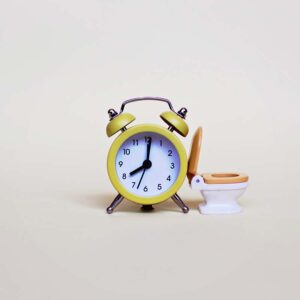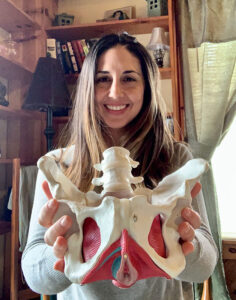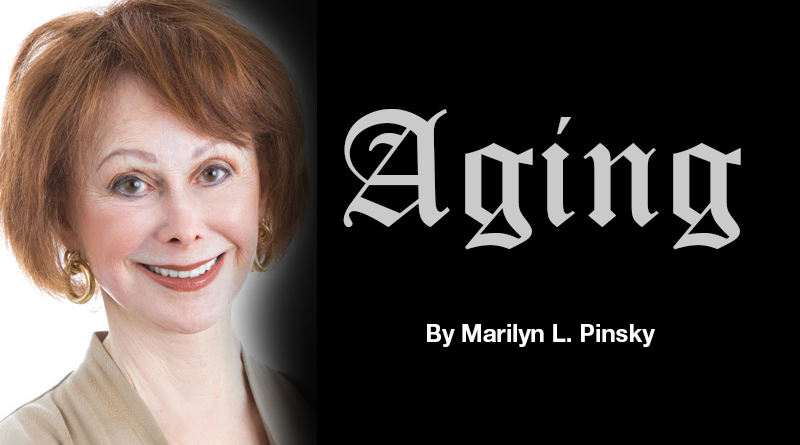Let’s Talk Plumbing (Part 2)
Can I get to the bathroom in time?
By Marilyn L. Pinsky
 We are discussing the issue of leakage as we get older.
We are discussing the issue of leakage as we get older.
The first article with urologist Elizabeth Ferry, assistant professor of urology at SUNY Upstate Medical University, discussed that after ruling out infections and more serious concerns, the issue is usually muscle tension. This article looks at the three-tiered approach to treating muscle tension.
➽Tier one is diet and physical therapy. “We look for what might be bladder irritants in your particular situation. Depending on what you eat, symptoms may be better or worse on different days. Not everything irritates everyone, so you have to find out your particular trigger through trial and error. For example, do you eat a lot of chocolate, coffee, soda, spicy foods, certain alcohols, tomato sauce or even bananas? The way to test it out is to stop eating one food at a time for a few days and see if it makes a difference.”
I can tell you from personal experience that tier one options take patience, but for me were worth doing. Bye, bye chocolate.
Ferry added that in addition to diet, there are other health conditions such as diabetes, sleep apnea or congestive heart failure, all of which can cause frequent urination at night.
➽Tier two is doing physical therapy (PT). That also takes patience as it is a learning process. I was referred to Upstate’s pelvic floor rehabilitation program, a specialized program that also deals with pain, urinary or bowel incontinence, frequency and urgency. I asked how people get into the program and learned that each situation is different. Though you can go directly there without seeing a doctor first, Medicare and Medicaid still require a referral.
It typically takes between six to 10 sessions to complete the program and the visits needed are determined after the first evaluation. I spent eight sessions with Rebecca Alexander Carey, senior physical therapist, learning how to exercise muscles I never even knew I had, let alone that they needed exercising.

Using a model of the pelvic floor, she explained how PT helps patients to retrain the muscles in this area. “There are three layers of muscles that need to work effectively and they are very small muscles. Most of these small muscles function best as a group and some work individually. Though all these muscles can be voluntarily controlled, some actions like coughing and sneezing, voluntarily passing gas, and peeing, require more reflexive processes to take place; most of us don’t know how to control the specifics of those activities because our body does them automatically.
“How we proceed depends on the individual situation, making the evaluation that is done at the first session vitally important.”
Carey advised, “The sooner you recognize you have an issue and start to address it, the better off you will be, whether it is incontinence, pain on urinating or constipation.
“We often hear people say, ‘What can you expect at this age,’ whether discussing leakage or intimacy. Some older patients haven’t been intimate in years, and don’t know if they ever will be again.
Maybe they just chalk it up to being married a long time. But one factor could be unaddressed pain, that gets worse to a point where you cannot be intimate anymore and that affects relationships.
This is a big reason people see pelvic floor specialists.”
“For men who are having penile pain, scrotal pain, ejaculation pain or orgasm pain, treatment starts with an evaluation of the musculature with a physical therapist who specifically works with men. They evaluate the resting position of the muscles and muscle tone and can do both external and internal exams to determine the cause of the problem.
Possible remedies are behavioral modification, such as changing certain habits including adding belly breathing when urinating, avoiding bladder irritants, becoming more aware of muscle tension throughout the day and learning to relax the abdominal and gluteal (butt) muscles. If the issue is with tightness in the hips or lower back, there is guided physical therapy, such as trunk stabilization exercises or pelvic floor stretches,” said Carey.
Back to urologist Elizabeth Ferry. “PT takes a while, so it depends on the road you want to take. Some people say, ‘I’ve had this situation for years and I just want to take medicine.’ In tier two there are a variety of medications to be used alone or in combinations that encourage relaxation of the bladder to enable it to stretch and hold more urine.”
➽ Tier three: “If medicines don’t get them where they want to be, we go to tier three for Botox injections and nerve stimulators. The thought is if the bladder is overactive and spasms, these options act like white noise to mellow it out. An example would be acupuncture once a week for a few months, or an implant.”
I asked Ferry if most people follow through with the advice. “For some people, going through five briefs in a day doesn’t bother them and for others, just one liner drives them crazy. Urologists are happy to be as aggressive to treat as it is bothersome to the individual.”
The takeaway is that incontinence is not something you have to live with. There is a lot we can do to improve the quality of our lives.
On a personal note, the previous article on retiring my title as ‘Queen of CIGBOT’ totally destroyed my plans to be a sexy senior. Everyone who knows me and has read that issue feels they now have to inquire about my bladder. I just know they’re imagining me dribbling all over town. In spite of that, I hope these articles help us recognize we’re all in this together. I also hope I have contributed to more meaningful cocktail party discussion. Though religion and politics are still out for polite conversation, leaking, constipation and ejaculation pain (who knew?) is now in.
Cheers!

